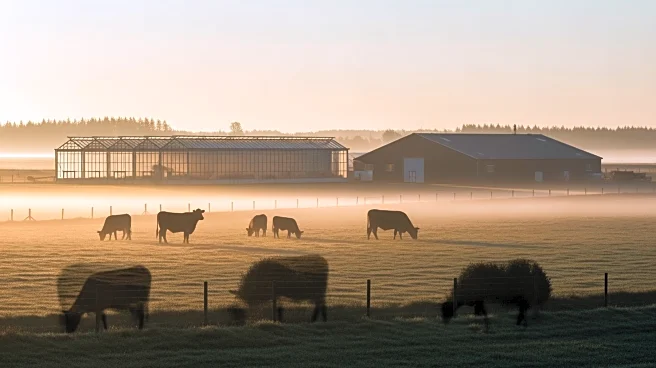What's Happening?
The University of Agriculture and Livestock Breeding (Maubin) was inaugurated in Myanmar, aiming to produce 300 agricultural and livestock professionals annually. The institution, under the Ministry of Agriculture, Livestock and Irrigation, was opened
by Senior General Min Aung Hlaing, Acting President of Myanmar. The university is designed to enhance human resources in the agriculture and livestock sectors, contributing to the national economy. It will offer degrees in agricultural and livestock sciences, with plans to expand similar institutions across Myanmar. The university comprises 13 departments related to agricultural sciences, 12 related to livestock sciences, and three arts and science departments. The initiative is part of a broader strategy to modernize agricultural practices and increase rural incomes, which are crucial for the country's economic growth.
Why It's Important?
The establishment of the University of Agriculture and Livestock Breeding is significant for Myanmar's economic development, particularly in rural areas where agriculture and livestock are primary sources of income. By producing skilled professionals, the university aims to modernize these sectors, moving away from traditional subsistence methods to more systematic practices. This shift is expected to increase productivity and household incomes, thereby reducing poverty. The initiative aligns with the government's efforts to enhance agro-based industries and support rural development, which is vital as agriculture contributes significantly to Myanmar's GDP. The university's focus on research and international standards will also help integrate modern technologies into local practices, fostering sustainable growth.
What's Next?
Future plans include establishing similar universities in upper Myanmar and opening agriculture and livestock breeding colleges in each region and state. The government intends to provide stipends to students, encouraging enrollment and supporting their education. These steps are part of a comprehensive strategy to develop human resources in agriculture and livestock sectors, essential for the country's economic transformation. The initiative is expected to attract more students from various regions, enhancing the skill set available for rural development projects. The focus on research-oriented education will likely lead to innovations in agricultural practices, further boosting productivity and economic growth.















